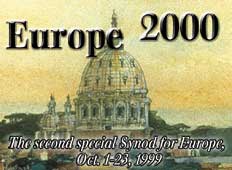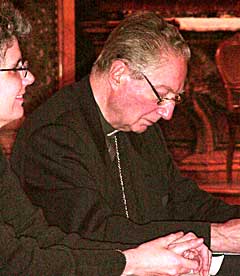

 |
 |
|
|
Cardinal Martini denies suggestion for another church council By Thomas C. Fox 
Cardinal Carlo Maria Martini, archbishop of Milan, told NCR Oct. 12 he has not called for another ecumenical council, contrary to some press reports. Martini clarified his intentions, telling NCR his synod comments in support of collegiality were of a general nature and not a specific call for bishops to come together in another ecumenical council. Martini is considered by some a possible successor to Pope John Paul II. However, Martini is a Jesuit and no Jesuit has ever been elected as pope. Further, Martini has said he expects to remain in Milan until his retirement and then relocate to Jerusalem. Despite his protestations to the contrary, Martini’s name is often placed on the lists of papabile, possible contenders to the throne of St. Peter. He is viewed as an intelligent pastor and one who has many international connections. Because he is considered to be an influential cardinal, Martini’s every utterance is measured carefully as a possible signal to the wider church as to where he would lead it were he elected pope. “I was not calling for a general council,” Martini said to NCR in a brief interview. “I was calling for a way to act collegially in the day to day life of the church. I was not talking about anything specific. I was talking about the way the church should be run in a general sense.” Martini’s Oct. 7 intervention, in the eyes of some, including several Italian journalists dangled the prospect that a Martini pontificate might move straight into Vatican III. Headlines in Italian newspapers the day after Martini spoke suggested the prospect of another council. One newspaper headlined its account of Martini’s remarks: “Holy Father, call a council.” “We are forced to ask, forty years after the announcement of Vatican II, if an awareness for the next decade is not growing little by little of the utility -- and nearly the necessity -- of a collegial and authoritative consultation among all the bishops on some of the key issues that have emerged,” Martini said at the synod. Another synod would not be enough for what he had in mind, Martini said. “Some of these issues probably require a more universal and authoritative collegial instrument, where they can be faced with freedom, in the full exercise of episcopal collegiality, while listening to the Spirit and protecting the common good of the church and all of humanity.” Though the Vatican press office issues only brief summaries of each speaker’s intervention and the specifics of Martini’s ideas were absent from his summary, NCR obtained the full text of Martini’s address. Martini was specific as to which issues he was talking about. “In general, the key task is the deepening and the development of the ecclesiology of communion of Vatican II,” he said. “Another is to address the deficit - in some places quite dramatic - of ordained ministers and the growing difficulty for bishops to ensure the care of souls in his territory through a sufficient number of ministers of the gospel and the Eucharist.” “Others include the position of women in society and the church, the participation of the laity in some ministerial responsibilities, sexuality, the discipline of marriage, the practice of penance, the relationship with the sister Orthodox churches (and in a more generalized manner, the need to revive ecumenical hope), and the need to work out the relationship between democracy and values, between civil laws and moral law,” Martini said. “Increasingly one feels how much it would be beautiful and useful for the bishops of today and tomorrow, in a church by now more and more diversified in its languages, to repeat that experience of communion, of collegiality and of the Holy Spirit that their predecessors had at Vatican II and that by now is no longer a living memory,” Martini told the synod. Martini has long been identified as a support of national episcopal conferences, instruments of collegiality. These conferences, however, have been increasingly stripped of their authority under the current pontificate. In 1988, Martini expressed opposition to a paper that Cardinal Joseph Ratzinger, head of the Congregation for the Doctrine of Faith, had written on national conferences in which Ratzinger argued they have no true canonical authority. Martini disagreed. “Our European episcopal conferences have purely and simply tried to let communion grow,” Martini said. Fox is NCR publisher and can be reached at TCFOX@aol.com National Catholic Reporter, October 12, 1999 |